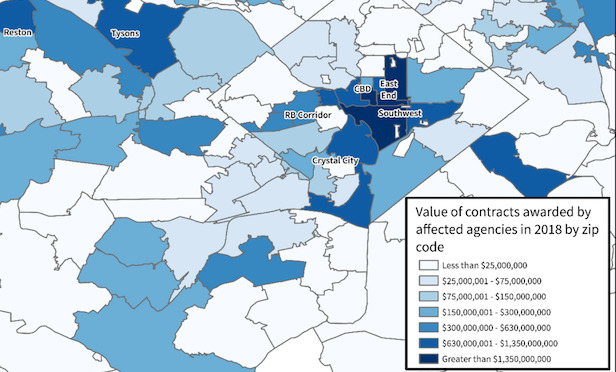WASHINGTON, DC—As President Donald Trump and Congress begin negotiations on a border wall and border security in order to avert another federal government shutdown on Feb. 15, two research papers released by commercial brokerage firm JLL and the Congressional Budget Office put hard numbers to the cost of the partial federal government shutdown that lasted 35 days.
JLL Research calculated that government contractors in the DC region were losing $81.9 million per day in lost or delayed revenue that was performed locally as a result of the partial shutdown that impacted 12 federal agencies and 800,000 federal workers that were either out of work or worked without pay.
A breakdown by location showed that Northern Virginia lost $32.8 million in lost or delayed revenue per day, primarily driven by the Department of Homeland Security (36% share) and Department of State (17% share). The top occupations driving these contracts were tech-related, including software engineers, computer systems analysts and IT support. JLL states that lost contractor revenue is occurring across the market, with Arlington County the largest ($4.2 million), followed by the Toll Road ($2.2 million) and Tysons ($2 million).
Washington, DC suffered $32.5 million in lost or delayed revenue per day, primarily driven by the Department of Homeland Security (32% share) and Department of Justice (14% share). The top occupations driving these contracts included administrative roles and management consultants such as budget analysts, financial analysts and legal contract specialists, according to JLL.
The daily toll for Suburban Maryland was $16.6 million in lost or delayed revenue primarily driven by the Department of Commerce and NASA, each with a 29% share. The top affected occupations were: electronics, mechanical and aerospace engineers, medical and health professionals and social scientists.
A positive in the JLL report was that large federal contractors appeared to have weathered the storm from the partial federal government shutdown.
“Despite being owed upward of $50 million from the government, or not receiving any new contracts, major contractors remain stable based on their increasingly diverse business models and sales to other foreign governments and the commercial sector,” JLL stated in its report.
However, the report noted that any prolonged shutdown will translate into fewer contract awards, depressed hiring and leasing volume over the first half of the year.
“Smaller contractors have been more likely to furlough thus far due to cash-flow issues in retaining employees who are on time-and-material contracts or cost-reimbursement contracts,” according to the report that was released just prior to the end of the shutdown. “As these small contractors tend to be in growth mode as far as leasing both in the traditional part of the office market, but increasingly so in the flexible space sector, regional absorption will see a short-term hit.”
Based on JLL's canvassing retailers in areas such as L'Enfant Plaza in Southwest and Constitution Center in NoMa, the firm estimated that retail sales in those locations were down more than 60% in January 2019 as compared to January 2018. In DC, lobbying activity in the first three weeks of January 2019 was down 31% as compared to the same period 12 months earlier.
In terms of the national impact of the 35-day long partial federal government shutdown the CBO calculated the price tag at approximately $11 billion.
As a result of reduced economic activity, CBO estimates, real (that is, inflation-adjusted) gross domestic product in the fourth quarter of 2018 was reduced by $3 billion. In the first quarter of 2019, the level of real GDP is estimated to be $8 billion lower than it would have been—an effect reflecting both the five-week partial shutdown and the resumption in economic activity once funding resumed, the CBO reported.
CBO estimated that the five-week shutdown delayed approximately $18 billion in federal discretionary spending for compensation and purchases of goods and services.
Last week, New York City Mayor Bill said that the federal government shutdown cost the city $500 million a month.
© Touchpoint Markets, All Rights Reserved. Request academic re-use from www.copyright.com. All other uses, submit a request to [email protected]. For more inforrmation visit Asset & Logo Licensing.








